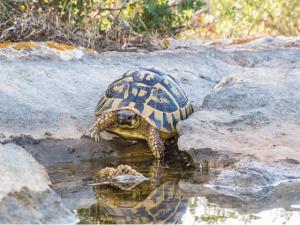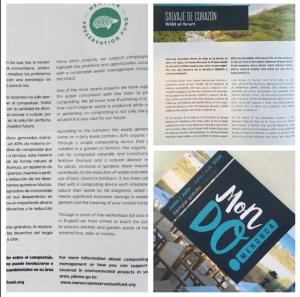Being a Biosphere Reserve
Mondo Magazine Menorca | June – July
Wild at heart
With an incredible offering of life on the ground, in the air and in the water, Menorca Preservation Fund explains more about what being a biosphere reserve entails and what we can do to help protect it.

Long known to tourists and locals alike as the ‘wild’ island of the Balearics, Menorca’s rich variety of indigenous plants, animals, fish, forests and wetlands are prime ecosystems for scientific and natural interest. In fact, as one of the most diverse and unique of all the Mediterranean island ecosystems, some 220 species of birds, and 1000 species of plants (60 of which are endemic) have been recorded on Menorca.
At the heart of the Biosphere reserve is the Albufera Natural Park at Es Grau, but the island also boasts a further five natural Reserves, two marine reserves and nineteen ANEI zones (Natural Areas of Special Interest).
In order to protect not only the natural habitats that exist, but also the extensive archaeological heritage of the island, it was in 1993 that Menorca was officially declared a UNESCO Biosphere Reserve.
This decision means that the flora and fauna, as well as the gullies, caves, wetlands, beaches and dune systems, streams and islets, are all closely monitored under The Consell Insular of Menorca’s sustainability program, so that future generations of residents and visitors can continue to enjoy the natural resources and beautiful countryside.
Equally, this label helps to further protect sites of cultural and historical interest. As a Biosphere Reserve, it is considered just as important to encourage a stronger concept of sustainable development of the landscape. This means human activity develops responsibly alongside the vital conservation of natural resources and heritage.
To help with this, the Consorci de Residus Urbans I Energia (The consortium for Urban waste and Energy) was established. The Consorci promotes management, research and education in ecosystem conservation, as well as supporting the sustainable use and development of natural resources within the areas of agriculture, water and sanitation, energy, transport, local communities, tourism and waste management.
For example, up until 1994, each town had its own landfill where they either buried and/or burned the waste. This resulted in not only wasted resources but also significant damage to the environment. Nowadays, the island has an improved waste management model with advanced environmental principles.
However, there is still a lot of work to be done as, at present, only 38% of urban waste is separated at home and only 25% of plastics are recycled. The prevention of waste generation and its reuse has become one of the priorities in the fight against climate change. The objectives set by the European Union are, among others, to reach household waste recovery rates of 50% by 2020 and to recycle 65% of urban waste by 2035.
With this principle, and within its commitment to sustainable development, the Consorci de Residus i Energia de Menorca works on several lines of action for the reduction of waste, ranging from the reform project of the Milà Waste Plant and the optimization of waste treatment, to the management and implementation of public awareness campaigns.
This is where the Menorca Preservation Fund comes in: MEPF aims to support local initiatives working within this area, or local groups that feel there is a need for greater community awareness. Amongst many other projects,, we support campaigns that highlight the problems and opportunities associated with a sustainable waste management strategy for the island.
One of the most recent projects we have supported the Waste consortium with has been to promotecomposting. We all know how frustrating it is to see how much organic waste is produced while cooking or gardening, so composting is not only the perfect solution but also vital for our future.
According to the Consorci, the waste generated at home on a daily basis contains 40% organic matter. Through a simple composting device that can be installed in a garden or terrace, this organic matter can be composted naturally and transformed into fertilizer (humus) and a natural disease repellent for plants, orchards or gardens. More importantly, it contributes to the reduction of waste and reduces the use of toxic chemical fertilisers.
It has been calculated that with a composting device each inhabitant could reduce their waste by 90 kilograms, which in turn, means significant economic savings in waste management and the lowering of your carbon footprint.
Through a series of free workshops (all also available in English) we have aimed to teach the public how to process kitchen and garden waste at home with minimal fuss, odor or money.
*
For more information about composting, waste management or how you can support or get involved in environmental projects in your local area, please email info@menorcapreservationfund.org

